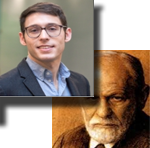 What lies in the deep waters beneath the Ego and Libido?
What lies in the deep waters beneath the Ego and Libido?
Jonathan Freeman, a psychologist and the project coordinator of the CEEDs (Collective Experience of Empathic Data Systems) project, said:
“What the science shows is that a lot of that background processing that we are not paying attention to can leak useful information about the environment. So it can identify whether there are areas of interest, whether there are threats, whether there is potentially something exciting that you have not spotted.
“You can use touch and vision and hearing to sense the environment and to make sense of the world around you,” he added. “So what we are trying to do is to make additional sense out of the subconscious processing that humans do. That gives people an extra power, an extra ability to understand meaning in big datasets.”
Scientists involved in this European Union research project hope to help us become smarter and more efficient by listening to and stimulating our subconscious so it can mobilize the power of our own creativity. And to do that, they are using complex technology.
According to Pedro Omedas, a computer scientist at the Universitat Pompeu Fabra:
“We are integrating virtual reality and mixed reality platforms to allow us to screen information in an immersive way. We also have systems to help us extract information from these platforms. We use tracking systems to understand how a person moves within a given space. We also have various physiological sensors (heart rate, breathing etc.) that capture signals produced by the user – both conscious and subconscious. Our main challenge is how to integrate all this information coherently.”
Anna Mura is a neuroscientist at the Universitat Pompeu Fabra.
“The system allows us to upgrade subconscious processes to make them conscious,” she said. “This can help us assimilate information in complex databases – information that would be impossible to decipher without that extra help.”
Researchers are also using robot technology.
Paul Verschure also works as a psychologist at the Universitat Pompeu Fabra.
“The brain is not a computer, simply controlling an external device,” he said. “The brain is tightly coupled to the body. And both brain and body are mutually constraining in what they do. So therefore, to understand the brain, we have to put it in the context of a body.”
The body he means is a robotic one: “To understand the brain, we need to embody it in a robot. This is the next step in this exploration of how the brain works, in the end, to understand the physical foundations of consciousness.”
It’s a step forwards in the research for a new scientific instrument to help us make sense of big data.
For more information see: